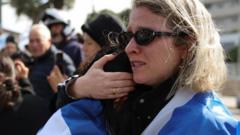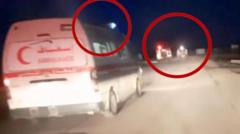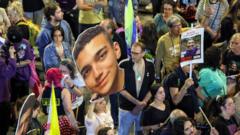The poignant return of four Israeli hostages' bodies has cast a shadow of grief across the nation, igniting deep reflections on loss and conflict.
Return of Fallen: A Day of Mourning in Israel

Return of Fallen: A Day of Mourning in Israel
Emotional scenes in Tel Aviv as bodies of hostages are returned amid ongoing tension.
On an overcast day in Tel Aviv, Israelis gathered at Hostages Square to mourn the return of four bodies belonging to individuals taken hostage during a violent conflict. This somber event began with a display from Hamas and other associated Palestinian groups, who highlighted the devastation caused by Israel’s military actions in Gaza while displaying the bodies before the crowd.
The deceased, identified as Oded Lifschitz, Shiri Bibas, and her two young sons, Ariel and Kfir, were met with a somber atmosphere as they were transferred in black coffins, illustrating the heartbreak of their tragic fates. Each coffin bore photographs of the individuals, surrounded by banners claiming they were victims of US-supported Israeli air strikes, a narrative that Hamas advocates without independent verification.
Red Cross officials attempted to ensure the handover was conducted respectfully but seemed to have little influence on how the event unfolded, with coffins presented in a public manner. A military ceremony honoring the deceased preceded their transportation to the forensic institute in Jaffa, where formal identification was set to occur. Along the journey, a handful of Israelis stood vigil, draped in flags and the color yellow—symbolizing the sacrifices endured by hostages and their families.
Emotions ran high at the vigil; many mourners were visibly shaken by the tragedy. Orly Marron, sharing her heartache, reflected on the burden of grief symbolized by the presence of the Bibas boys’ images around the country, noting an overwhelming sense of despair over the loss.
The ripple effects of the abductions extend beyond personal tragedy. Oded Lifschitz's son, Yizhar, expressed a yearning for resolution, lamenting the ongoing cycle of violence without a solution to the conflict. "We left it simmering," he stated somberly, encapsulating the broader fear and uncertainty prevalent among the families and citizens impacted by the situation.
In Gaza, reactions to the transfer of bodies differed markedly, with many Palestinians asserting bitterness over the unequal treatment accorded to Israeli victims—their own kin lost under the rubble of conflict remain unnamed and unacknowledged. As protests grow against the military actions that have ravaged their landscape, calls for justice intensify.
While efforts for reconstruction in Gaza have commenced with the arrival of bulldozers, the spirit of loss and the urgency for closure linger in the air, reminding all affected that the path forward remains fraught with unresolved pain and questions.
The deceased, identified as Oded Lifschitz, Shiri Bibas, and her two young sons, Ariel and Kfir, were met with a somber atmosphere as they were transferred in black coffins, illustrating the heartbreak of their tragic fates. Each coffin bore photographs of the individuals, surrounded by banners claiming they were victims of US-supported Israeli air strikes, a narrative that Hamas advocates without independent verification.
Red Cross officials attempted to ensure the handover was conducted respectfully but seemed to have little influence on how the event unfolded, with coffins presented in a public manner. A military ceremony honoring the deceased preceded their transportation to the forensic institute in Jaffa, where formal identification was set to occur. Along the journey, a handful of Israelis stood vigil, draped in flags and the color yellow—symbolizing the sacrifices endured by hostages and their families.
Emotions ran high at the vigil; many mourners were visibly shaken by the tragedy. Orly Marron, sharing her heartache, reflected on the burden of grief symbolized by the presence of the Bibas boys’ images around the country, noting an overwhelming sense of despair over the loss.
The ripple effects of the abductions extend beyond personal tragedy. Oded Lifschitz's son, Yizhar, expressed a yearning for resolution, lamenting the ongoing cycle of violence without a solution to the conflict. "We left it simmering," he stated somberly, encapsulating the broader fear and uncertainty prevalent among the families and citizens impacted by the situation.
In Gaza, reactions to the transfer of bodies differed markedly, with many Palestinians asserting bitterness over the unequal treatment accorded to Israeli victims—their own kin lost under the rubble of conflict remain unnamed and unacknowledged. As protests grow against the military actions that have ravaged their landscape, calls for justice intensify.
While efforts for reconstruction in Gaza have commenced with the arrival of bulldozers, the spirit of loss and the urgency for closure linger in the air, reminding all affected that the path forward remains fraught with unresolved pain and questions.




















